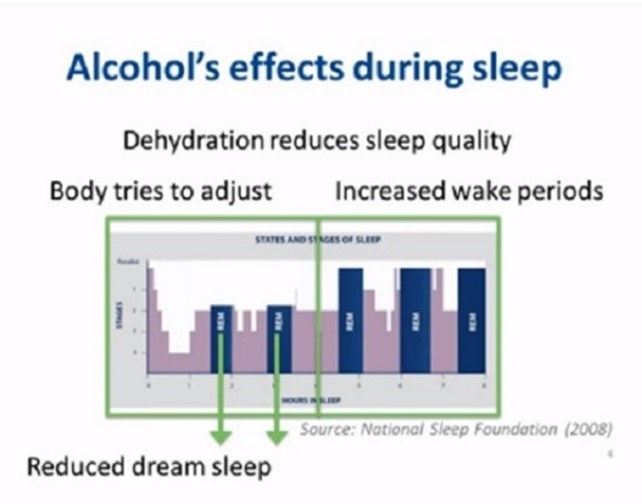Sleep Hygiene for the Menopause
- Mark Dobson

- Sep 1, 2025
- 4 min read
Sleep hygiene refers to a set of practices and habits that are conducive to sleeping well on a regular basis. Good sleep hygiene includes maintaining a consistent sleep schedule, creating a comfortable sleep environment, and avoiding stimulants before bedtime.

How alcohol impacts your sleep
Alcohol acts on your nervous system and causes brain activity to slow down. We may feel this has a benefit in helping us sleep, but many studies show that alcohol actually disrupts sleep, especially rapid eye movement sleep (REM) our cognitive restorative sleep. REM sleep is reduced during the menopause, and alcohol exacerbates this further!
Alcohol also increases the risk of obstructive sleep apnoea and central sleep apnoea. The reduction of oestrogen and progesterone during the menopause has already increased this risk!

Melatonin, the hormone essential for maintaining our circadian rhythm and sleep schedule can be disrupted by alcohol.
Is there a better time to have a drink to help me relax?
Alcohol is absorbed into our blood stream very quickly and will remain there until the liver is able to metabolise it, which typically is at a rate of 1-unit per hour. So, to prevent alcohol disrupting our sleep architecture, stages of sleep, it is better to have say one glass of wine early in the evening allowing 2-3 hours for it to be metabolised.

What can help? Your 10- point sleep hygiene check list.
Your sleep room needs to be as dark as possible, with blinds and curtains to block out natural light. No light emitting electronic devices and cool to about 18 degrees. If you have a bed partner who takes up most of the duvet then adopt the Scandinavian method of separate duvets.

The bedroom environment should be as “cave-like” as possible. Cool (about 18 degrees), dark, and quiet. Eliminate sources of light from windows, doors, and electronic equipment. Turn the digital clock radio away from you or place it under the bed. If you can’t eliminate sources of light, consider a sleeping mask. If you are unable to eliminate sources of noise, consider turning on a fan in the room, getting a white noise generator, or earplugs. Heavy curtains can also muffle outside noises. To cancel noise, don’t use television, radio, or any source of sound that varies in frequency or volume. Use a fan for ‘white noise’, especially if you are a light sleeper. White noise uses a mix of sound frequencies to create a static-like sound, it can be intense and high-pitched, like a fan or an air conditioner. Remove pets from the room.

Limit total caffeine consumption and have none after noon. Caffeine can have a long half-life in sensitive individuals. Remember it’s found not only in coffee, but tea, soda, chocolate, and OTC medications. If you’re currently having more than five cups of coffee per day, consider tapering by mixing in decaf.

Try to maintain consistent mealtimes and avoid heavy meals late in the evening. A light carbohydrate snack in the evening may promote sleep.

If you smoke, avoid smoking heavily near bedtime and don’t smoke during awakenings at night. You may inadvertently condition yourself to wake up frequently during the night.

Limit all liquids during the last two hours before bedtime.

Regular Exercise may promote deeper sleep. However, there is relative decrease in body temperature associated with sleep onset and maintenance. Therefore, you should avoid strenuous exercise within three hours of bedtime, as it will raise body temperature and disrupt sleep.

Have a hot bath or shower before bed. Research suggests a warm bath or shower an hour or two before bedtime can help you unwind and fall asleep faster. Why? It will help lower your core temperature, and that's a circadian sleep signal. Also let’s consider how the warm water helps relax muscles and reduces pressure on the knees and joints, which allows the body to be fully supported. It increases circulation and reduces swelling and inflammation.

Schedule some “worry time” in the late afternoon or early evening. Use this time to plan activities for the next day or to think about things that may cause you to feel upset, angry, or anxious. It’s easy to get into the habit of thinking about worrisome things when you are in bed. It’s quiet, there are no distractions, and there are no other competing activities. It’s a very bad habit in terms of sleep. Keep a pad and pencil handy, but outside the bedroom, so you can jot down ideas that seem important during the night. If you are awake enough to be aware that you are thinking of solutions to problems, you should be out of bed. Getting the ideas out of your head and onto a piece of paper may make it easier to get back to sleep.

Here is your modern-day technology challenge! Remove all technology from the bedroom other than a standard alarm clock. Your brain may just wake you up to engage with your phone/ iPad/ laptop, TV, leading to light unrefreshing sleep!

References
Bupa. 2024. How does alcohol affect your sleep? https://www.bupa.co.uk/newsroom/ourviews/alcohol-sleep#:~:text=How%20alcohol%20impacts%20your%20sleep,have%20disrupted%20sleep
Sleep Foundation. 2025. Alcohol and Sleep Apnea. https://www.sleepfoundation.org/sleep-apnea/alcohol-and-sleep-apnea
NHS. 2023. Common questions about melatonin. https://www.nhs.uk/medicines/melatonin/common-questions-about-melatonin/#:~:text=It's%20an%20offence%20to%20drive,and%20have%20difficulty%20waking%20up.
National Library of Medicine. 2029. A Warm Bedtime Bath Can Help You Cool Down And Sleep Better. https://www.ncbi.nlm.nih.gov/search/research-news/3495/
Psychology Today. 2019. How Hot Baths Help You Sleep and Alleviate Pain. https://www.psychologytoday.com/gb/blog/sleep-newzzz/201908/how-hot-baths-help-you-sleep-and-alleviate-pain



Comments